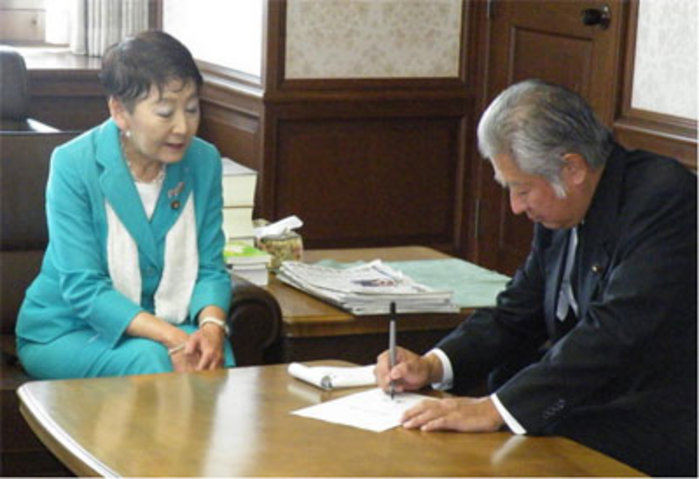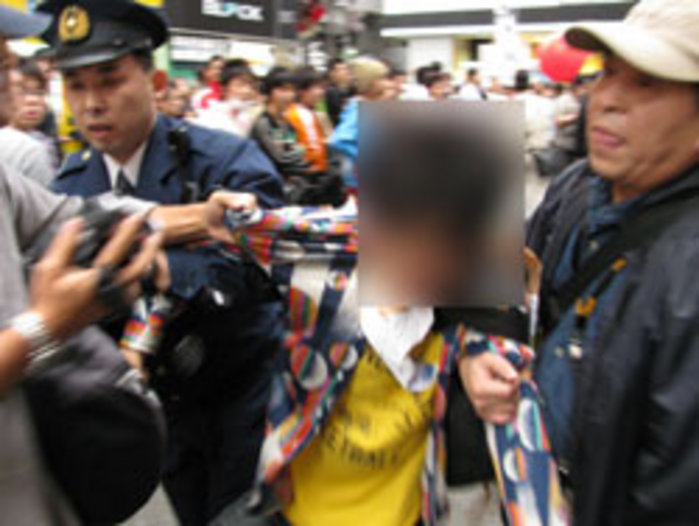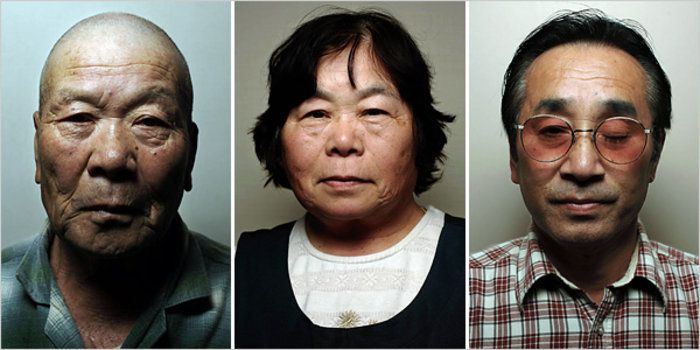Transfer of Power at Japan’s Justice Ministry
Lawrence Repeta
It may take a little while to get used to this. Longtime observers of the approach to criminal justice sponsored by LDP governments have grown accustomed to several disturbing aspects, including harassment and prosecution of political dissidents on trivial charges (see, e.g., David McNeill), repeated efforts to expand police power through legislation such as the wiretapping law, the long-proposed criminal conspiracy law and others, and total disregard of criticisms and recommendations from international human rights treaty organizations. (Link)
The landslide victory of the Democratic Party of Japan (DPJ) in parliamentary elections held on August 30, 2009 is likely to result in policy change in many areas. There seems little doubt that we will see a very different approach to calibrating the balance between police power and individual rights.
One of the more startling appointments to the new Cabinet is that of Yokohama lawyer Chiba Keiko to be Minister of Justice. The authority of the Ministry is great, with responsibility to enforce criminal laws, protect individual rights, manage the immigration system, and generally oversee the legal system itself, including preparation and review of draft legislation. Ms. Chiba’s appointment should result in a sharp change in policy. She brings with her a history of more than two decades in the Diet in which she opposed nearly all LDP initiatives related to Ministry operations.
Chiba at work
Ms. Chiba’s opposition to the death penalty has made headlines, but this is only one example of her progressive agenda. Among other things, she has supported local voting rights for non-citizen permanent residents, clear recognition of the injuries suffered by so-called “comfort women” and other victims of Japan’s past aggressions, and expanding the admission of refugees to Japan. Chiba’s track record should provide strong clues to the kind of attitude she brings to her new post.
If there was any doubt on this score, she wiped it away in formal comments released on September 16, the day the new Cabinet took office. In her first message to the nation as Minister, Chiba declared that her mission is to help build a society that respects human rights and a judicial system that is “close to the people” (kokumin ni mijika na shiho). To achieve this, she listed three specific steps. First is the establishment of a new human rights agency. Second is ratification of so-called “Optional Protocols” to human rights treaties. Third is creating transparency in criminal interrogations.
The baton passed from LDP Minister of Justice Mori Eisuke to DPJ Minister Chiba Keiko
Her selection of these particular measures for the spotlight displays ambition to make significant institutional reform. They strike at the heart of an established regime that allows arbitrary power to police and other officials. All three measures have been recommended many times by United Nations human rights bodies and other international organizations, but were categorically rejected by LDP governments.
An Independent Human Rights Commission for Japan?
The proposals to establish an independent human rights commission and to ratify “Optional Protocols” to several human rights treaties are each directed toward providing individuals with avenues to bring complaints of abuse to bodies outside the control of the Ministry of Justice and the courts.
The independent commission idea has been around for a long time. Following hearings in 1998, the UN Human Rights Committee declared that it was “concerned about the lack of institutional mechanisms available for investigating violations of human rights and for providing redress to the complainants,” and went on to say “The Committee strongly recommends to the State party (Japan) to set up an independent mechanism for investigating complaints of violations of human rights.” Why was this so important? Because, the Committee explained, “there is no independent authority to which complaints of ill-treatment by the police and immigration officials can be addressed for investigation and redress.”
More than one hundred countries around the world have established such an “independent authority.” In Asia, they include the Republic of Korea (see www.humanrights.go.kr), Thailand, Malaysia and the Philippines. It is safe to assume that government representatives in virtually all of these countries were wary of creating an investigating agency they could not fully control. To help overcome their reluctance, representatives of a range of governments, existing human rights institutions and NGOs met in Paris in 1991 to create a set of model standards for such commissions. Formally adopted by a resolution of the UN General Assembly in 1993, these standards are generally known as the “Paris Principles.”1
Under LDP leadership the Japanese government did respond to the Committee’s recommendation, proposing legislation to establish a new commission in 2002. But the LDP bill was roundly criticized by Japan’s bar associations and other experts as proposing a vehicle that would rest securely under the thumb of the Ministry of Justice. As this debate moved forward, suddenly newspapers filled with stories of the brutal treatment of inmates at Nagoya Prison and other penal facilities, including cases of excessive force causing inmate deaths. One cannot imagine a better illustration of the need for investigation by an outside watchdog. The LDP proposal would simply lead to the government examining itself. There could be no reasonable expectation that it would conduct meaningful investigations into abuses by the police, prison officials, or other government officers with coercive authority. The 2002 “human rights bill” was allowed to expire without formal Diet action. It has not been revived since.
Optional Protocols
Likewise, Minister Chiba’s second proposal, ratification of Optional Protocols to the International Covenant on Civil and Political Rights (ICCPR) and other human rights treaties would enable individuals to bring their complaints directly to new fora, in this case to the multinational committees charged with overseeing treaty compliance. Japan has ratified at least six major human rights treaties, but has never agreed to any protocol or treaty provision that would empower individuals to plead their cases in such an international forum. This is a popular reform in the international community. For example, as of 2008, 109 countries had ratified the Optional Protocol to the ICCPR. But LDP governments have been steadfast in resisting demands for this reform. The government has repeatedly argued that allowing individuals to bring complaints directly to an international body would violate Japan’s national sovereignty. The new Minister of Justice, on the other hand, has long been a supporter. In recent years Japan’s national bar association has also mounted a major lobbying offensive on its behalf. According to Chiba’s September 16 declaration, the government position on this issue has also been reversed.
Recording Interrogations
The third item on her short list is also a familiar recommendation from international organizations. Japan’s practice of extended police interrogations of suspects outside the presence of counsel has shocked international observers for many years. In October 2008, the UN Human Rights Committee wrote “the substitute detention system (daiyo kangoku), under which suspects can be detained in police detention facilities for a period up to 23 days to facilitate investigations….increases the risk of prolonged interrogations and abusive interrogation methods with the aim of obtaining a confession.” These words echoed those of the UN Committee Against Torture issued the year before when that Committee wrote that lengthy interrogation without the presence of counsel “increases the possibilities of abuse of their rights, and may lead to a de facto non respect of the principles of presumption of innocence, right to silence and right of defense.”
In her September 16 comments, Chiba also proposed a new regime of transparency in interrogations of criminal suspects. Video recording of interrogations has been recommended by the UN treaty bodies mentioned above, by other international bodies, and by Japan’s bar associations to create a clear record and to discourage interrogators from using abusive techniques in their quest to secure confessions.2 She followed up at a press conference on October 13, announcing the creation of a study group including herself, the other two senior political appointees in the MOJ and members of the MOJ Criminal Bureau to consider how best to “realize transparency” (kashika wo jitsugen) in interrogations. She refused to set a timeline for committee proposals, but said the group would promptly get to work. The 2007 DPJ transparency bill that passed the House of Councilors but failed in the LDP-controlled House of Representatives should provide a clear blueprint.
Readers should be aware that over the past two years, the Ministry of Justice commenced recording interrogations on a trial basis. However, recording has been limited to interrogation segments the prosecutors have themselves selected. It is hard to dispel the image of recorded confessions preceded by unrecorded multi-day third degree interrogations that may have preceded them. In October 2008, the UN Human Rights Committee described the pre-trial processes as “sporadic and selective use of electronic surveillance methods during interrogations, frequently limited to recording the confession by the suspect.” Therefore, the Committee recommended that the government “ensure the systematic use of video recording devices during the entire duration of interrogations and guarantee the right of all suspects to have counsel present during interrogations.” See this source.
What about free speech?
We should view Ms. Chiba’s September 16 declaration as only the beginning of an ongoing review of a broad range of policies. One issue at the forefront of any review should be the protection of political speech. We have just passed through an era in which police and prosecutors were used for blatantly political goals. The most important politico-legal issues of the past decade have been the LDP campaign to revise the Constitution, expand Japan’s military activities to encompass participation in hostilities abroad, and enforce greater discipline over the Japanese populace generally. The high tide of this campaign was reached during the period from commencement of the Iraq War in spring 2003 (and Diet passage of a Special Measures Law in July 2003 authorizing SDF deployment to the war zone) and Diet passage of a revised Fundamental Law of Education under Prime Minister Abe Shinzo in December, 2006.3
The public security police and prosecutors were used during this era to suppress dissent by prosecuting individuals who publicly criticized government policy, especially deployment of the SDF to the war zone. (See McNeill). Thus, pamphleteers were not only removed from the streets (for an infamous example from the Aso era, see this source), but also jailed and prosecuted.
Police arrest a man taking part in an organized walk to view Prime Minister Aso’s Shibuya Ward, Tokyo, home on Oct. 26, 2008. COURTESY OF PART-TIMER, ARBEITER, FREETER & FOREIGN WORKERS
One individual, a retired high school teacher, was even arrested and prosecuted for the “crime” of interfering with a graduation ceremony because he urged parents to remain seated during the playing of kimi ga yo. It seems unlikely that the police and prosecutors will continue this campaign under DPJ rule. The new Minister herself voted against the bill that formally adopted kimi ga yo as the national anthem when it passed the Diet in 1999.
With the DPJ committed to reducing support for American military activities abroad and seeking a path toward reducing the American military presence in Japan, particularly in Okinawa, peace protesters may have less rationale to take to the streets. Moreover, the government no longer has a political rationale for harassing them.
A Winding Road to Reform?
Reforms such as an independent commission and access to international bodies are important. They should generate independent evaluations of individual cases, provide non-government focal points for the news media, and otherwise draw the attention of the community. But such bodies have no enforcement power. Governments are free to disregard their conclusions and recommendations in the same manner that LDP governments have ignored repeated recommendations of the UN Human Rights Committee and other bodies. Hearings – or the threat of hearings – before such bodies will have significant effect only to the extent they lead to change within the Ministry itself. These institutions would simply provide new weapons in an ongoing fight between advocates of greater personal liberty versus strict maintenance of “public order.” Perhaps we are observing a savvy politician who thinks the most effective strategy is to open the door to action outside the Ministry in order to promote reform within.
Introducing video or audio recording of interrogations is another matter entirely. This strikes very close to the bone of deeply entrenched practices of the police and prosecutors. Internal opposition could be fierce.
But this reform could have powerful effects. The interrogation room is the place where police capture confessions and demand that criminal suspects agree to incriminating statements drafted by the police themselves. The doors to this room have been closed to cameras, tape recorders and defense counsel. With the exception of recent partial recordings, the sole record of the interrogation has been a document produced by the police. If interrogators must perform before a camera or tape recorder from the moment they first confront a suspect until interrogations are finished, a fundamental change in behavior is inevitable. For the first time, police and prosecutors would have to defend their behavior in court against an objective record.4
But Who Really Runs the Ministry?
Minister Chiba must now confront the great chasm between political posturing and implementing policy. The precedent established by previous justice ministers is not encouraging. During the era of LDP rule, ministers were generally viewed as meek followers of their prosecutor subordinates. In his epic study of Japanese prosecutors, David T. Johnson even cited sources to say that the minister is “’utterly irrelevant,’” except perhaps in corruption cases involving high level politicians.”5
When these words were written, few imagined DPJ control, still less the ascension of a progressive outsider to the Minister’s seat. There has never been a Minister of Justice like Chiba before, a lawyer who comes to the office with an agenda so clearly contradictory to the established “way of justice.” She and other DPJ appointees to senior MOJ positions must contend with attitudes and modus operandi entrenched over decades of LDP rule in which the primary theme was continual expansion of police power. But as the minister, Chiba is in position to select the next prosecutor general and direct appointments to other senior prosecutorial positions. If there are like-minded senior prosecutors, they may find that their career prospects have brightened.
While she works inside the Ministry, her outside strategy may also move forward. If the DPJ pushes its legislation through the Diet, Ms. Chiba’s colleagues from activist wings of Japan’s bar associations can be expected to aggressively use the new human rights commission and the international human rights committees to bring embarrassing cases like the Shibushi prosecution and others based on false confessions into the spotlight.6 And we may be more likely to see misbehaving police and prosecutors called to account.
Among those forced into false confessions in the Shibushi case , from left; Yamashita Kunio, Hamano Eiko and Kawabata Sachio. (Photo Ko Sasaki)
Keeping Promises
Implementing these measures will not be easy. Establishing an independent commission and ratifying treaty protocols requires Diet action. Although the DPJ and its allies hold strong majorities, there will surely be voices seeking to protect the status quo. Progress on these issues will indicate the degree to which Japan’s new governors are willing to expend political capital on poorly understood measures related to human rights protection. Whatever the result, there is no doubt that this government takes a fundamentally different view of its obligations under Japanese law and human rights treaties from what we have seen in the past.
Lawrence Repeta is a professor of law at Omiya Law School in Japan, presently a visiting scholar at the University of Washington, and an Asia-Pacific Journal associate. He is author of the chapter on law and society in the forthcoming “Handbook of Japanese Culture and Society,” edited by Theodore C. Bestor and Victoria Bestor, to be published by Routledge in spring 2010. He wrote this article for The Asia-Pacific Journal.
Recommended citation: Lawrence Repeta, “Transfer of Power at Japan’s Justice Ministry,” The Asia-Pacific Journal, Vol. 44-2-09, November 2, 2009.
Notes
1 Link.
2 For a valuable discussion of this issue, see David T. Johnson, The Japanese Way of Justice, pp.273-74 (Oxford University Press, 2002).
3 Gavan McCormack’s timely book, Client State (Verso, 2007) provides a finely detailed account of this era, including description not only of government measures to promote militarization, but also violent attacks on opponents by rightwing extremists.
4 For description of several cases of prosecutor brutality in the interrogation room, see Johnson, supra n. 2, at 254-63.
5 Johnson, supra n. 2, at 120.
6 The Shibushi case involved the prosecution of 11 individuals for vote buying in a local election in Kagoshima. Many were subject to abusive interrogations for months, including the successful candidate, who was detained for an incredible 395 days. Despite the interrogators’ success in producing several confessions, all defendants were found not guilty by a trial court that decided the confessions were coerced and the entire story was concocted by the police. See Norimitsu Onishi, “Pressed by Police, Even Innocent Confess in Japan,” New York Times, May 11, 2007.
Japanese human rights lawyers produced a 45 minute documentary film of this incident which was shown at the headquarters of the United Nations in Geneva and other venues. See this source.






